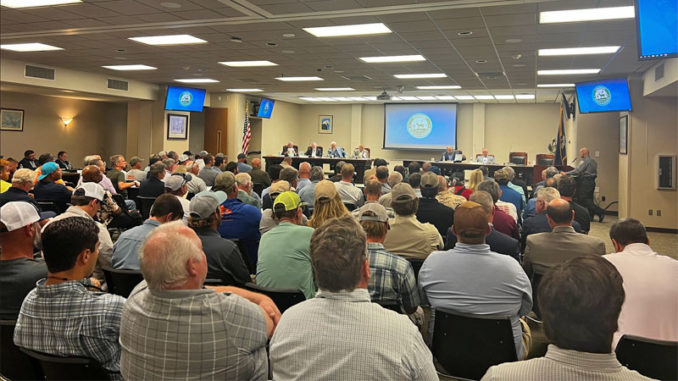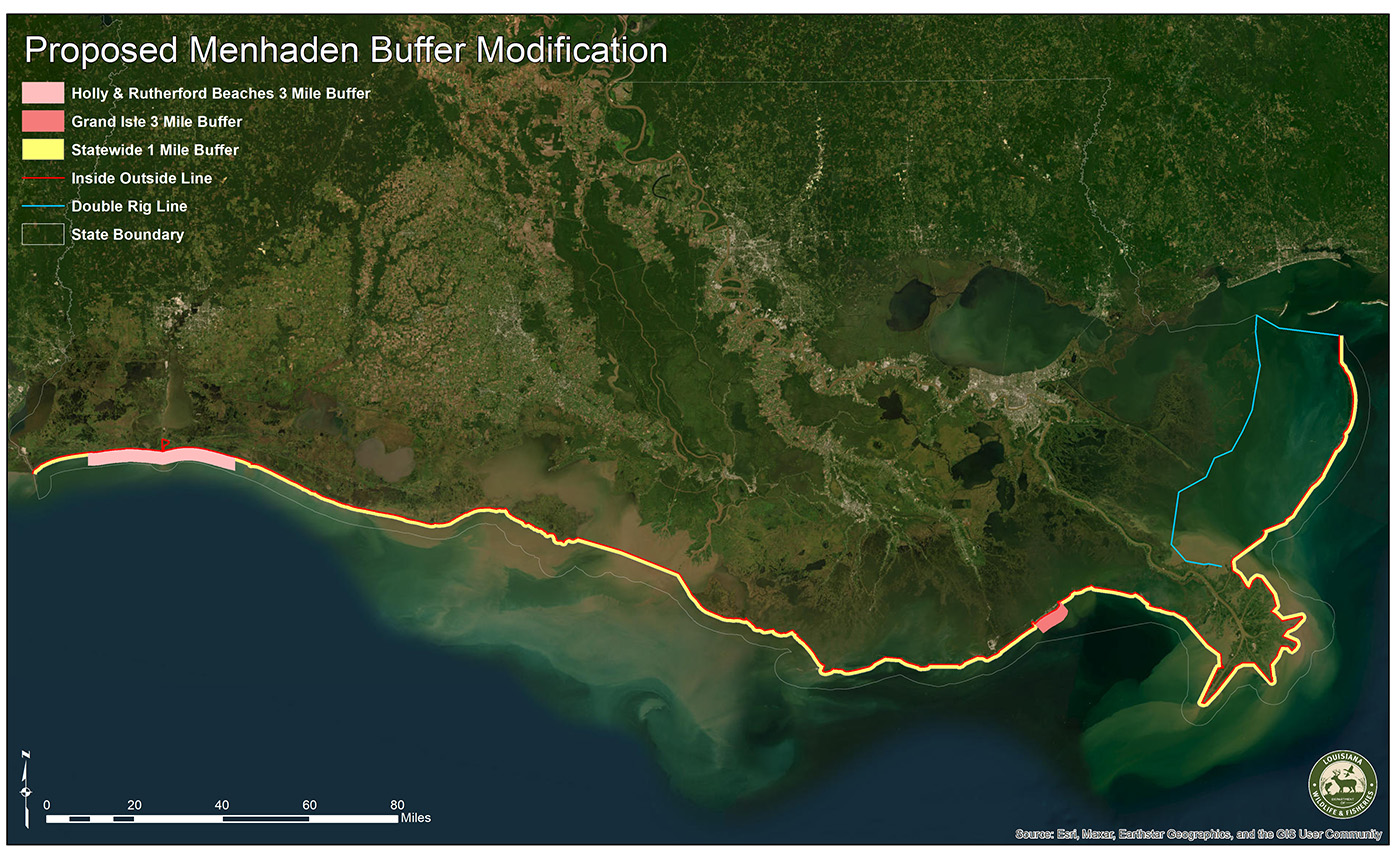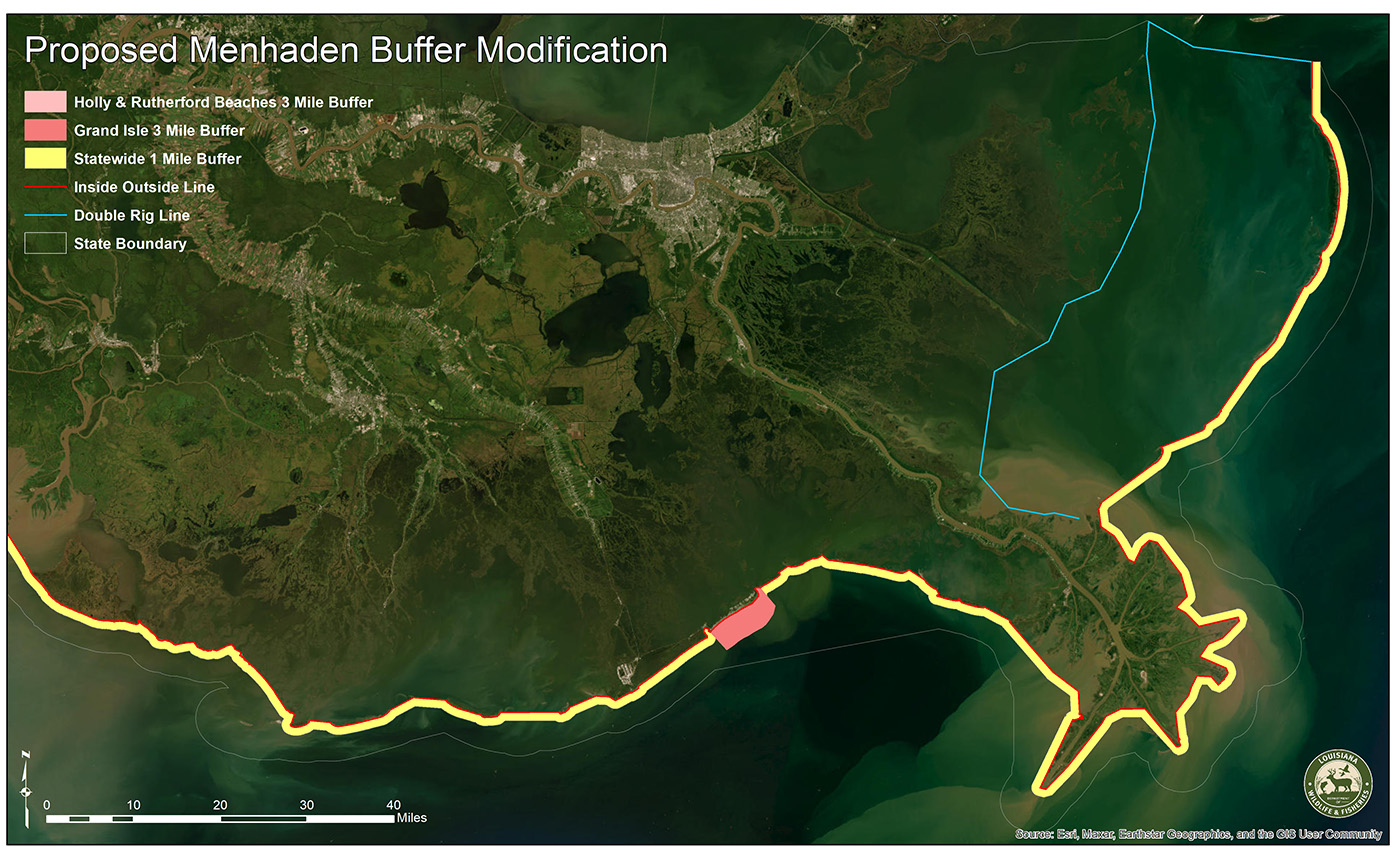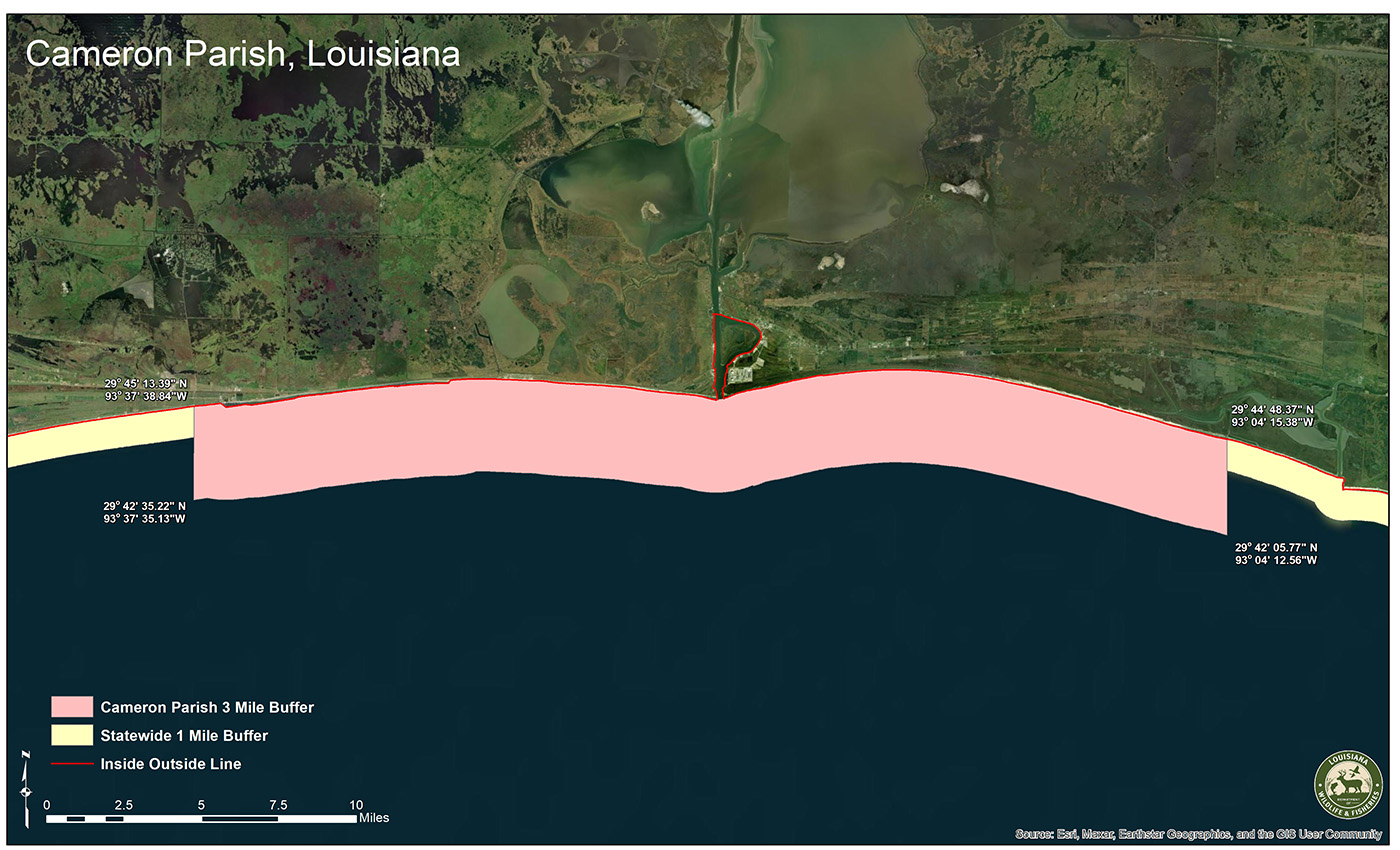
Eighteen menhaden fisheries spills were recorded by Louisiana officials this year.
Three major spills were publicly documented during the week of Sept. 11 through Sept. 15 alone, causing the Louisiana Wildlife and Fisheries Commissioners to pass a Notice of Intent (NOI) modifying current rules for the industry. The issue has been brewing for years with only token changes.
The NOI was passed during the Oct. 4 regular monthly meeting of the LWFC with commissioners Andrew Blanchard, Brandon DeCuir, Joe McPherson and Andy Brister voting in favor of the measure.
The three separate September menhaden net tears occurred along Holly and Rutherford beaches. The incidents were highly reported on social media and local news along with gut-wrenching photos of countless thousands of dead fish, including pogies and highly prized bull redfish.
Netting critical forage
Two foreign owned companies, Daybrook of South Africa and Omega Protein of Canada, fish daily for menhaden in the Gulf of Mexico, often in water so shallow their boats can barely operate. Westbank Fishing operates boats for Daybrook. Ocean Harvester operates boats for Omega. Ocean Harvester’s annual harvesting of gulf menhaden alone is approximately 1.5 billion annually.
“This is an industry that takes about a billion pounds of critical forage from Louisiana shorelines, millions of pounds of bycatch, including 1,000s of spawning redfish,” said David Cresson, CEO of CCA Louisiana, in an interview after the meeting. “Meanwhile, the recreational fishing community is facing reduced limits on redfish. We cannot continue to ignore what this industry is doing to our coastline, to our fisheries and to coastal businesses. Thank goodness our commission decided to take action.”
According to the LDWF website, agents cited Omega Protein for two counts of failing to report the release of purse seine gear for menhaden within two hours and Westbank Fishing LLC for excessive killing of fish on Oct. 4.
In July of this year, a 154-foot ship owned by Westbank Fishing was cited for fishing within a restricted buffer zone off Terrebonne Parish near Vermillion Bay. Omega Protein has had several spills this season and was responsible for 16 of the 18 incidents this year. In years past, these events have gone largely ignored by the industry and have received political protection from officials tasked with protecting our resources.
“These companies say time and time again that these incidents are rare,” Cresson said. “To find out there have been 18 this season, it just brings about more doubt as to what you can believe from these folks.”
Sorry for the “inconvenience”
Kenny Hebert, director of gulf operations for Ocean Harvesters, spoke at the Oct. 4 meeting.
“We are unfortunately aware that our operations at times has inconvenienced Louisiana coastal residents,” Hebert said. “To remedy the situations our company is taking steps to reduce infrequent incidents of net tears that release fish.”
According to Hebert, the fishing industry takes responsibility for the Holly Beach incident and said his company was testing the use of stronger, fiber netting during the 2023 season. That isn’t good enough for sportsmen and conservationists, who have grown weary of excuses and delay tactics.
Hebert acknowledged their nets were not inspected daily.
Biological data
Meanwhile, commissioners acknowledged there was not much biological data that supported the NOI, but there was an abundance of “user conflict” data shown by the majority of meeting attendees who spoke in favor of the regulations. Sportsmen wonder why more data hasn’t been developed, since this has been a growing concern the past eight years.
Commissioner Kevin Sagrera voted against the NOI and is from the commercial fishing industry heavy Vermillion Parish. He said about the highly-profitable pogie industry, “I have a problem that it is not biologically driven. It is user group conflict driven, and the financial impact statement is real important to me. There is some information that came from Vermilion Parish concerning the economic impact.”
Sagrera has a background in the commercial fishing industry, according to the LDWF website.
A large majority of the attendees were in favor of the NOI and were vocal in their support, as well as countless thousands more across the state, including more than 80 state representatives and senators who co-signed a letter to the commission demanding at least a one-mile buffer.
One of those who was in favor of the NOI and attended the meeting was State Representative Joe Orgeron, whose District 54 covers Jefferson and Lafourche parishes. He said he was in favor of a 1-mile buffer zone and clarification of fines and restitutions.


Killing with intention
Another person attending the meeting who was in favor of the NOI was Devin Denman, owner of Louisiana Fishing Blog.
“What is alarming about the menhaden fishery is not what it kills unintentionally but what it kills with intention,” Denman said. “Everything is threatened by the removal of menhaden. I’m talking about shrimp, crab, oyster, everything that our coast depends on.”
After that statement, McPherson gave an almost threatening warning to the audience.
“I’m going to let the audience understand something,” he sternly said. “If you are going to get up there with unfounded characterizations and rhetoric, then this thing could go either way. You need to stick to facts that you know and documented and express your opinion that’s fine. But, we need to be careful with the rhetoric we use with the votes on this commission.”
Vermillion Parish resident, Bubba Broussard, cautioned commissioners the menhaden fishing industry played a vital part in state economics.
“Menhaden is an industry that brings a lot of jobs to our area,” Broussard said. “They pay a lot of taxes. I am in favor of trying to keep an industry in our area that we need. These people are providing a lot of good paying jobs.”
Ben Graham, of Baton Rouge, said the modified rules would not affect the menhaden fisheries.
“I have no interest in putting anybody out of business,” Graham said. “Going a mile out is not going to effect that at all. I support the NOI.”
Still work to do
Modified menhaden rules, according to the NOI, establishes a coastal buffer zone for the commercial harvest of menhaden 1-mile off the entire Louisiana coastline and three miles from the area between Holly Beach and Rutherford Beach in western Louisiana. This action will extend the existing ¼-mile buffer and the existing 3-mile buffer at Grand Isle, La., will remain in place. The NOI establishes a 48-hour period for retrieving any menhaden or bycatch that is unintentionally or intentionally released into the environment and provides penalties and restitution associated with failure to comply, plus increasing reporting to the Enforcement Division.
Before the rule becomes final, the Commission will hear a presentation about the economic impacts of this rule.
“This is not over,” Cresson said, noting that concerned citizens and elected officials have to see this through. “There is still work to be done. This is an extremely positive step, but there is still work to do.”